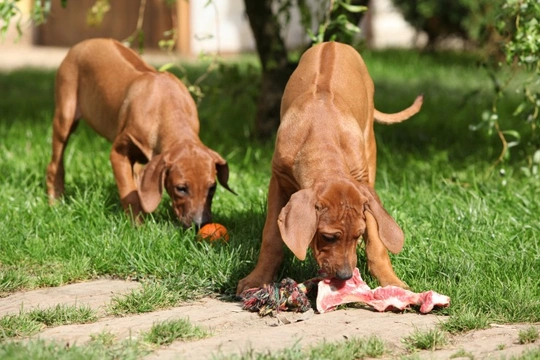
Four feeding suggestions for dogs given the BARF diet
The BARF diet (biologically appropriate raw food) refers to a way of feeding the domestic dog that is more in line with the traditional types of diet that dogs would have eaten in the wild, when they had to hunt or scavenge for their own food. There is a significant amount of debate among dog owners and canine nutritionists over whether the BARF diet is actually a far superior way to feed dogs than the modern commercial food diets, or whether it offers more scope to go wrong and cause problems, and providing a BARF diet for your dog can certainly prove both expensive and time consuming!
Before you even consider giving your dog a BARF diet, you will need to spend plenty of time researching it first, including weighing up the various opinions on this method of feeding, and finding out about the pros and cons of doing so.
Getting the BARF diet right in terms of providing appropriate, balanced nutrition can be challenging too, and the BARF diet involves feeding a whole range of foods including raw meat, bones, vegetables and supplements too.
In this article, we will provide four suggestions for those feeding the BARF diet, including some ingredients and combinations that you might like to try. Read on to learn more!
Raw meaty bones
The BARF diet is known by many different names, one of these being the “raw meaty bones” diet, as this is what generally forms the basis and main bulk of the feeding plan. What you feed, when you feed it and what else goes with it needs to be planned out over the course of the week, to provide your dog with both variety and all of their essential nutrients, and the meat portion of the diet is a good place to start.
Some of the meats that you might like to feed to your dog include chicken, beef, turkey, lamb and pork, and even potentially less common offerings such as rabbit. The cut of the meat that you buy is important too, and dogs do not require the premium cuts of meat such as fillet steak, but rather cheaper but more nutritious cuts that combine meat, muscle and fat, as well as the bone, which is essential to provide calcium and gnawing material to help to keep the teeth healthy.
Because the meat is given raw, it is vital to ensure that the bones present are not apt to splinter or have sharp ends to them, and also, that the meat is properly stored and served so that it does not carry high loads of potentially harmful bacteria.
It is entirely possible to mix bones from a larger meat cut such as lamb or beef with raw meat from something such as chicken, which may have small bones that could be swallowed whole or splinter.
Meat on the bone should not be fed alone as your dog’s sole diet, but should be combined with other ingredients such as vegetables in order to provide a balanced, nature-appropriate diet.
Eggs and cooked veggies
Eggs are a great source of high quality protein at an affordable price, and in combination with vegetables, can form an integral part of your dog’s diet. Eggs can be boiled, scrambled or poached (not fried) and mixed with a whole range of veggies including broccoli, carrot, lettuce, peas and many more!
Egg is also an excellent binding product, which means that they can be useful to help you to make up meals for feeding on the go in a container.
Seeds and raw veggies
Feeding some nutritious seeds and pulses as part of the BARF diet is a great idea, and adding a sprinkling of these to your dog’s meals once or twice per week can give them a real boost. Variety is one of the keys to feeding the BARF diet effectively, and combining seeds and pulses with raw veggies in your dog’s diet will help to provide a wide range of essential nutrients and trace elements.
Soya beans and sunflower seeds are two options, which can be fed in combination with a range of raw, chopped veg, including spinach, cauliflower, sweet potato, swede, celery and parsnip.
Essential supplements
Feeding the BARF diet to your dog means that you will also need to feed them some nutritional supplements and trace elements, which should be decided upon in combination with your vet or a canine nutritionist.
Fish oil to provide essential omega three fatty acids is one of these, and a source of zinc, vitamin E and vitamin B are all important too. You may also want to consider feeding probiotics to your dog to help to boost the good gut bacteria that helps with digestion, and a general purpose vitamin supplement that is approved for feeding to dogs too.



